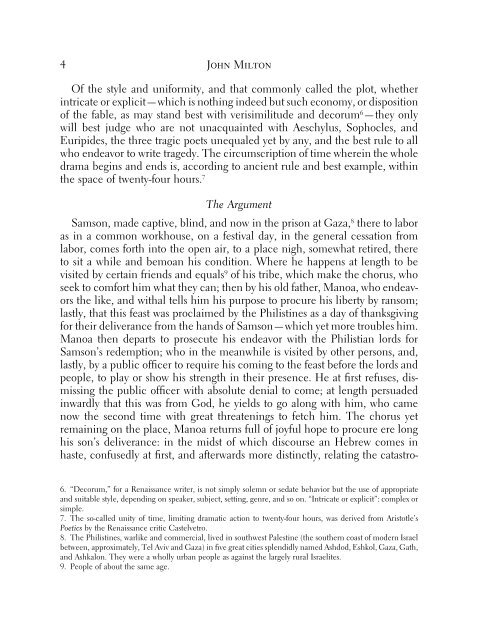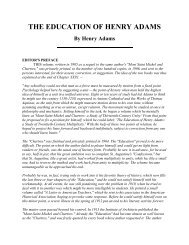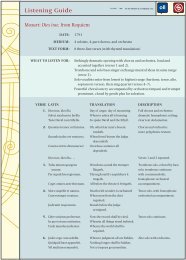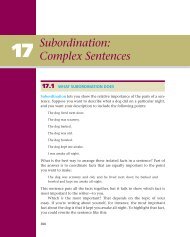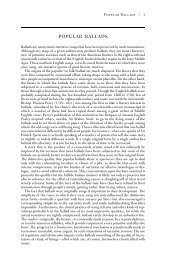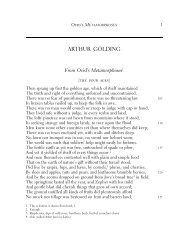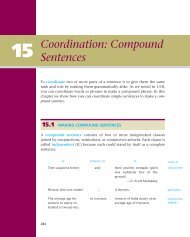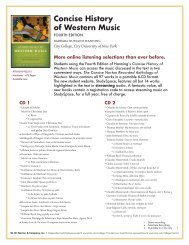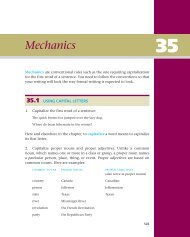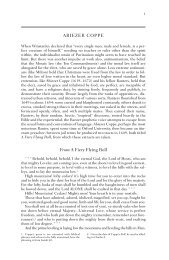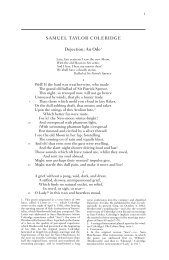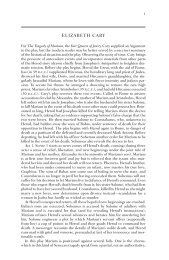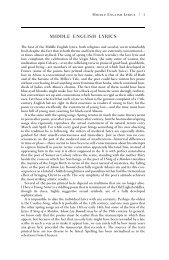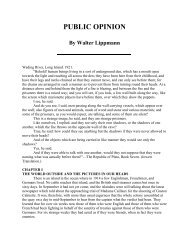Paradise Lost: The Arguments - WW Norton & Company
Paradise Lost: The Arguments - WW Norton & Company
Paradise Lost: The Arguments - WW Norton & Company
Create successful ePaper yourself
Turn your PDF publications into a flip-book with our unique Google optimized e-Paper software.
4 John Milton<br />
Of the style and uniformity, and that commonly called the plot, whether<br />
intricate or explicit—which is nothing indeed but such economy, or disposition<br />
of the fable, as may stand best with verisimilitude and decorum 6 —they only<br />
will best judge who are not unacquainted with Aeschylus, Sophocles, and<br />
Euripides, the three tragic poets unequaled yet by any, and the best rule to all<br />
who endeavor to write tragedy. <strong>The</strong> circumscription of time wherein the whole<br />
drama begins and ends is, according to ancient rule and best example, within<br />
the space of twenty-four hours. 7<br />
<strong>The</strong> Argument<br />
Samson, made captive, blind, and now in the prison at Gaza, 8 there to labor<br />
as in a common workhouse, on a festival day, in the general cessation from<br />
labor, comes forth into the open air, to a place nigh, somewhat retired, there<br />
to sit a while and bemoan his condition. Where he happens at length to be<br />
visited by certain friends and equals9 of his tribe, which make the chorus, who<br />
seek to comfort him what they can; then by his old father, Manoa, who endeavors<br />
the like, and withal tells him his purpose to procure his liberty by ransom;<br />
lastly, that this feast was proclaimed by the Philistines as a day of thanksgiving<br />
for their deliverance from the hands of Samson—which yet more troubles him.<br />
Manoa then departs to prosecute his endeavor with the Philistian lords for<br />
Samson’s redemption; who in the meanwhile is visited by other persons, and,<br />
lastly, by a public officer to require his coming to the feast before the lords and<br />
people, to play or show his strength in their presence. He at first refuses, dismissing<br />
the public officer with absolute denial to come; at length persuaded<br />
inwardly that this was from God, he yields to go along with him, who came<br />
now the second time with great threatenings to fetch him. <strong>The</strong> chorus yet<br />
remaining on the place, Manoa returns full of joyful hope to procure ere long<br />
his son’s deliverance: in the midst of which discourse an Hebrew comes in<br />
haste, confusedly at first, and afterwards more distinctly, relating the catastro-<br />
6. “Decorum,” for a Renaissance writer, is not simply solemn or sedate behavior but the use of appropriate<br />
and suitable style, depending on speaker, subject, setting, genre, and so on. “Intricate or explicit”: complex or<br />
simple.<br />
7. <strong>The</strong> so-called unity of time, limiting dramatic action to twenty-four hours, was derived from Aristotle’s<br />
Poetics by the Renaissance critic Castelvetro.<br />
8. <strong>The</strong> Philistines, warlike and commercial, lived in southwest Palestine (the southern coast of modern Israel<br />
between, approximately, Tel Aviv and Gaza) in five great cities splendidly named Ashdod, Eshkol, Gaza, Gath,<br />
and Ashkalon. <strong>The</strong>y were a wholly urban people as against the largely rural Israelites.<br />
9. People of about the same age.


